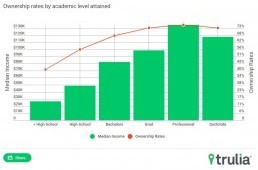
October 6, 2017 | by Katie Claflin
Categories: First Time Buyer, Homeownership
If you want to buy a home, one of the best ways to make that happen is to stay in school, according to a recent study conducted by Trulia.

Studying each of the stages of education--less than high school degree, high school degree, bachelor’s degree, graduate degree, professional degree and doctorate degree-- the study finds that, percentage-wise, homeownership gains are highest between those without a high school degree and those who have earned at least a high school degree.
The study found that 56% of people with a high school degree own a home, compared with only 40% of people with less than a high school degree.
And, the higher your education achievement level, the more likely you are to attain homeownership. Homeownership rates are highest among people with bachelor’s (67%), graduate (74%), professional (76%), and doctorate (74%) degrees. The reason seems simple. People with more education tend to earn more money, and more money equals more purchasing power, especially in areas where housing is expensive.
The Trulia study provides specific data for the 100 largest metros areas, including Austin, Dallas, El Paso, Fort Worth, Houston, and San Antonio. Overall, homeownership rates are highest in El Paso and Fort Worth and lower in Austin and Dallas where housing prices have increased significantly in recent years.
Below are the results for each city:
TSAHC helps those at any education level purchase a home by providing a grant to help with down payment and closing costs. First-time buyers can also qualify for a tax credit that can save them up to $2,000 every year on their income taxes. These programs put homeownership within reach for thousands of hard-working Texans every year.
To learn more, visit www.ReadyToBuyATexasHome.com.
On the House blog posts are meant to provide general information on various housing-related issues, research and programs. We are not liable for any errors or inaccuracies in the information provided by blog sources. Furthermore, this blog is not legal advice and should not be used as a substitute for legal advice from a licensed professional attorney.
TSAHC reviews all blog comments before they are posted to ensure a positive experience for our online community. Off-topic comments; hostile, derogatory or deliberately insulting comments; and comments specifically promoting goods and services will not be posted.
Approved comments will be published in their entirety. Personal information will not be removed unless it pertains to someone other than the person submitting the comment. For more information, please see our Comment Posting Guidelines.
To remove a previously submitted and published comment, please contact Anna Orendain at [email protected].
If you have a question regarding any of TSAHC's programs, please contact us.
